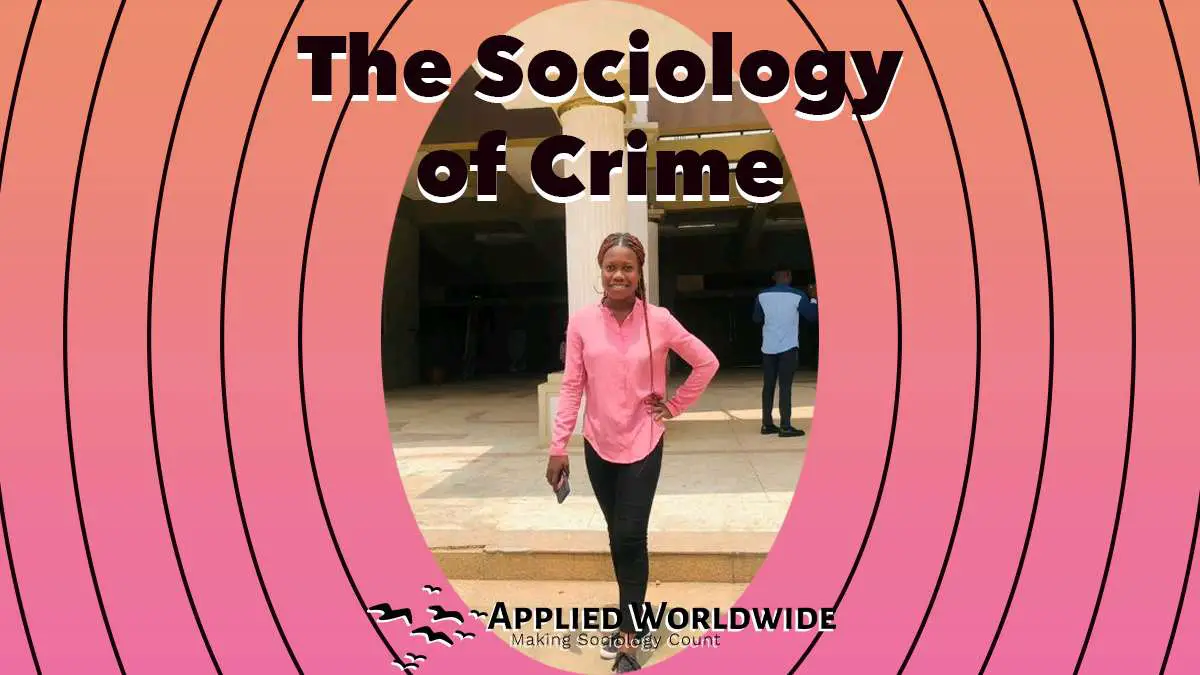Damilola O. Ogunbona is a student, writer, a passionate change maker, a public speaker, and a Christian. She is currently a sophomore student of sociology at the University of Ibadan, Ibadan, Nigeria. Based on her interests, she has devoted herself to activism centered on youths, on matters regarding growth, change, political awareness, and personal development in Nigeria. She is also a member of various organizations dedicated to the above ideas, among which are Boys without Borders—an initiative focused on the growth and development of the boy-child, Asido Foundation—a mental health initiative primarily interested in helping youths on school campuses to maximize their health mentally, and also an ambassador for Civic Campus Scheme. As a student, she loves modules that dwell on critical thinking skills, and solving logical puzzles which primarily defines her interests in sociology of crime.
To start with, what are crimes?
Taking it as a layman would, crime is anything that is a violation of the law. However when asked to define crime, as a student of sociology, I will say it refers to behaviors that are contrary to the cultural standards, agreed norms and shared values in a society. If I may add to this, crime is closely associated with deviance which explains my latter definition of crime. However, in crystal clear terms, anything cannot be regarded as a crime until it is evaluated to be against the legal codes in a society/state.
What is Sociology of Crime?
Sociology of crime is a field in the social sciences involved with the scientific study of how individuals or institutions in a society define acceptable behaviors and establish sanctions for unacceptable conducts, which are regarded as deviance or crimes.
According to the Sociology of Crime, why are crimes committed?
Intuitively observing crime patterns historically and globally, the causation of crimes are linked to external conditioning from the society, which makes it almost impossible for an average individual to choose freely which behavior to exhibit, criminal or not. Let’s say a young man who is born to a dysfunctional home, where the single father is a poor illiterate drunkard, if exposed to such kind of predictable social conditions, is more likely to end up being a criminal than a person born to a well-to-do family.
Factually, looking at the causes of crime would take us to examining empirical theories on the origin and what accelerates committing crimes.
There have been various attempts by recognized Sociologists (the ones who have researched/are researching the field of criminology) of the positivist school of thought at explaining the reasons for and patterns of crime.
Out of all the attempts, three macro theories have continued to be the premise upon which the contemporary explanation for the causes of crime are done.
They are; the Functionalist, Conflict and Symbolic Interaction theories.
Theoretical Perspectives on Crime
The Functionalist posits that the incidence of crimes, interchangeably deviance could be as a result of the desires of individuals to challenge existing social views and legal codes, or the difficulties associated with abiding with society’s prescriptions of values accepted in the process of goal attainment.
Some functionalists go further to believe that social disorganization or unstable social conditions are possible causes of crime.
And of course, the Conflict perspective comes from a Marxist angle, the unequal socio political economic conditions, the powerful elites, both of these views promoting the point that crimes are facilitated by the conditions which people of certain strata are subjected to, the division of which Karl Marx calls the Proletariats, who are not able to attempt to an upward mobility and in retaliation, resort to committing crimes.
The Symbolist Interaction argues that the more certain categories of individuals, who are exposed to crime perpetrators predominant area, are more likely to get enough justification to engage in crimes and consequently commit crimes.
Against misconstruing terms, what is delinquency and what is deviance? What are they to the ‘concept of crime’?
Delinquency and deviance are both terminologies often employed by sociologists or criminologists. Delinquency occurs where a person under a legal age of adulthood commits a crime or crimes. Deviance, as an independent concept, refers to exhibiting behaviors and actions not in conformity with the prescribed societal values.
While being independent of each other, it is also pertinent to note that both concepts can apply in a single phenomenon or differently. For example, in Nigeria, a college student, Student X, under the age of 18 is not yet legal, but he joins his friends older than him on a car racing spree when he’s unqualified legally to drive a car. If caught by law enforcement agents, he could be said to be a delinquent, violating the law. In a different scenario, he is seen dressed to his lecture room in his pajamas, where they are no obvious formal rules on dress codes, he is seen as a deviant by others because even while it’s not emphasized formally, it is decent of a male to dress to conform to the social standards of shirts and trousers.
These two illustrations can either apply to different persons or a single person at different times. Thus making Student X either a delinquent or a deviant and in some cases both.
Social norms are not universal. What a norm is here might not be there. A deviance can only be considered within the context of social norms. Do you agree?
Yes, norms are unique to every society, but notwithstanding, there are also universal norms which can be found in every society, no culture permits stealing as a laudable act, this is a common norm you’re likely to perceive in every society, irrespective of their unique beliefs or values, and same goes for murder. Norms like this are what Zeno, Thomas Aquinas and Grotius explains as natural laws that should guide Man’s conduct.

From the functionalist theory, where deviance is challenging social constructs, what does it mean?
The school of thought was promoted by notable sociologists like Robert Merton, Emile Durkheim. It explains that deviance occurs when there is a successful attempt to challenge existing social constructs, the functionalists propose a set of beliefs similar to the Organic Analogy, where every part of the society is responsible for the maintenance of the society, with each institution: The family, education, religion, political institution, health sector, all given specific roles, and to perform these roles, guides in form of norms are put in place.
Here in Nigeria, it is expected that a man can only have marital or sexual ties with a female, homosexuality is considered as a deviation from this social construct and also the Nigerian laws criminalizes same sex unions as can be found in The Same-Sex Marriage Prohibition Act.
Are all unconventional or atypical behaviors necessarily deviant?
Unconventional or atypical behaviors can be considered deviant within the society where it is done, but does not necessarily mean a crime everywhere.
Is socialization an instrument of social control against deviancy?
Socialization is a limited tool for social control. Individuals are bound to form their personal opinions regarding the supposed normal order or proper behavior.
In sociology, there are two perspectives on how socialization takes place; The Nature and The Nurture perspective.
While nature is biological and unaltered, the nurture process can redefine a preconceived desirable nature of an individual. This is to say that it is possible for a person who is born to a nonviolent household (family) be influenced by external variables of socialization (peer group, school, mass media).
So when socialization is used in the context of social control, it can only be effective if both the nature and nurture process advocates the same values, which is not usually the case in all situations.
Is socialization ever perfect?
I won’t say socialization is never perfect, because it basically involves inducting people into the way things are done, but again, things are not done the same everywhere. Socialization lies within the thin line between perfection and relevance. Socialization is relevant to live anywhere, but there are no scales to measure or determine a perfect socialization process.
How can societies bring deviant members into conformity to its norms?
Sometimes, deviance is necessary to effect a social change, and it’s an obvious fact that the society is dynamic, we are in a changing world, nevertheless, there are certain deviant behaviors that cannot be considered as a fuel for social change, take for instance, corruption, while it is a menace eating deep into many political systems globally, it is never enough as a reason to see corruption as the new normal.
Sanction is a widely accepted way of ensuring adherence to values, norms or laws. Sanctions have proven durable for social cohesion, and they can either be informal, or formal in case of legal sanctions through criminal justice systems.
Let me also add that sanctions can be positive or negative, a reinforcement for an accepted behavior is a positive sanction that could be done formally or informally; a person who is praised for being a whistleblower in apprehending law breakers by the recognized by the law as a patriot (formal) or applauded by the public for being a responsible citizen (informal). In contrast to one who is found guilty of a criminal charge and liable to prison term (formal and negative sanction).
Physical punishment is a direct employed method of social control. How well has it been able to eliminate deviant behaviors?
Physical punishment is a prehistoric mentality of social control and does not in anyway totally eliminate deviancy in all persons, it only eliminates the occurrence of deviance in a person for a period of time.
A continent like Europe bans the use of physical punishment as a negative sanction due to the reports from health experts on the hazards of physical punishment on the physical and mental health. In addition, quality researches have shown that physical punishment is less effective in eliminating deviance, despite the heavy sanctions on murder globally, murders still occur at alarming rates through terrorism, physical abuse etc.
Though you will probably still find some schools in the Sub Saharan Africa still upholding the use of corporal punishment on students, studies have shown that physical punishment does not create a logical restraint from deviance but rather creates fear in the victims.
What is your view on corporal punishment?
Corporal punishment are like I said earlier, prehistoric and does not have a place in the current social trend. It is a very ridiculous method of social control, which I suggest should be replaced anywhere it is found with quality corrective measures such as seclusion from the larger society for specific periods of time e.g. detention, curfew, bans or imprisonment.
There are victimless crimes such as gambling. What does the concept mean?
To be a victim means being at an unfair position where a crime is perpetrated that is, being at the receiving end or being the one who is greatly affected in the execution of that crime. Victimless crime is the term used to describe the category of crimes where there is no victim involved. It is a type of crime where either the single perpetrator is committing a crime against himself, or the participating actors are engaging in it on a consensual basis. An example is gambling.
According to the sociology of crime, how can crimes be eradicated?
Eradication is an improbable term that cannot be subtly employed where the prevention of crime is concerned, needless to say, the occurrence of crimes can be reduced, noting that crimes or deviances in themselves exist to reinforce the acceptable norms, practices and the law.
Using social control as an enabling vehicle for crimes prevention is one of the widely accepted ways to reduce crimes; socialization, sanctions, labeling are all instruments of crimes prevention in modern societies.
Does crime affects the perpetrator?
There are various types of crimes, violent crimes, nonviolent crimes, corporate crimes, hate crimes and victimless crimes. In all of these categories, a crime may not explicitly affect the perpetrator during the execution of the crime, in the long run when a criminal gets nabbed by the law enforcement agencies, their resulting sanctions his crimes can bring him can in turn affect him (the perpetrator), shape his lifestyle and in some severe sanctions on crime , life imprisonment or death may be the perpetrator’s fate, so I would say, from my perspective, crimes may implicitly affect the perpetrator, and there may be other instances too.
What are violent crimes and property crimes?
In a simple analysis, violent crimes involve the use or threat of force by a perpetrator in criminal acts like rape, murder, armed robbery. On the other hand, property crime also involves the theft or destruction of properties by criminals, without the application or use of force.
Thank you for sharing these input?
Thank you Applied Worldwide.







